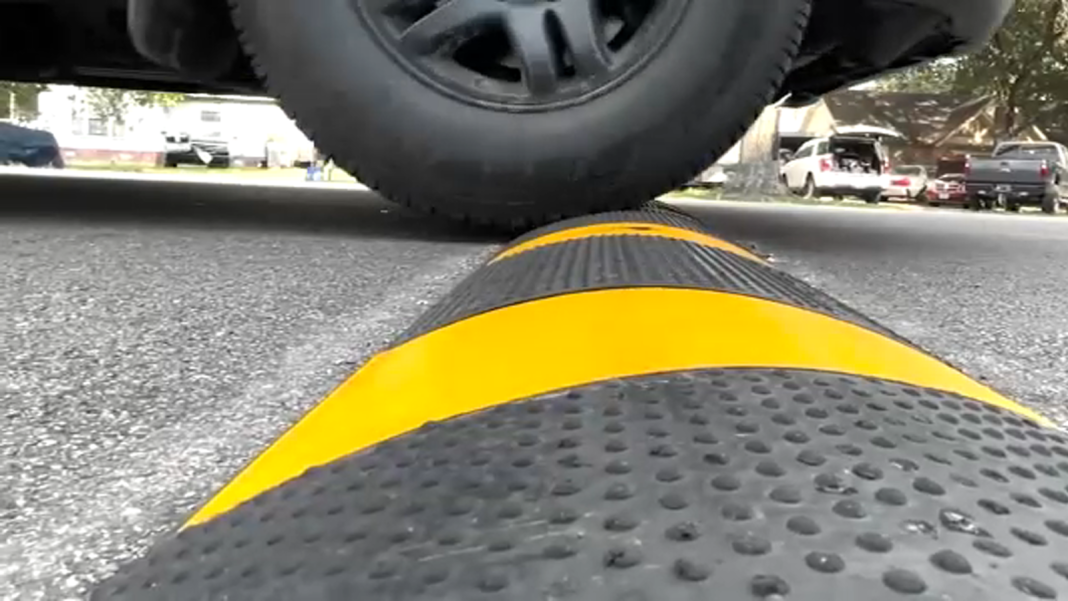In the quiet corners of west Harris County, Texas, a community grapples with the complexities of local governance, public safety, and the nuances of property ownership. The story unfolds around Eula Morgan Road, a once-quiet lane turned contentious battleground over speed bumps installed by residents seeking to reclaim their peace from the incessant roar of speeding vehicles.
For years, Beverly Wolfe, a dedicated resident of this neighborhood, has been at the forefront of a struggle to secure better road maintenance and safety measures. Her journey began with a simple plea to the county for assistance, only to face bureaucratic hurdles that left her feeling frustrated and unheard. “Call after call after call… I’ve worked on it for 6 years,” Wolfe recounted, capturing the weariness that comes from persistent advocacy in the face of apathy.
The turning point came in 2023 when residents, facing escalating issues with speeders using their road as a shortcut, took matters into their own hands. They installed speed bumps, a grassroots effort born out of necessity. “The speeding was getting out of hand,” explained Michelle Burns, another resident who joined Wolfe in this endeavor. However, the community’s attempts at self-regulation were met with an unexpected backlash. Just days after the bumps were installed, Precinct 4 officials announced their removal, claiming the speed bumps were unpermitted.
This abrupt action sparked confusion and frustration among residents. They believed that their property records indicated Eula Morgan Road was private, thus giving them the authority to implement such measures. Yet, as the local governance scrutinized the matter, it was revealed that the road had transitioned to county ownership during a commissioners’ court meeting in June 2023. Although Eula Morgan Road was not explicitly listed in the meeting’s agenda, officials had voted to allocate funds for the maintenance of “orphan” roads—those without clear ownership.
Beverly Wolfe’s emails with county officials, spanning from 2019 to 2022, painted a picture of ongoing miscommunication. One email highlighted that the road was considered an “unrecorded subdivision,” placing the responsibility for drainage maintenance squarely on the shoulders of individual property owners. “They can’t touch our property because it’s private,” Wolfe lamented, emphasizing the paradox of having a private road suddenly claimed as public without any prior warning or consultation.
As the narrative unfolded, Precinct 4 acknowledged the speeding issues and conducted a traffic study, revealing that Eula Morgan Road might qualify for “traffic calming measures.” However, the assurance felt hollow to residents like Wolfe, who pointedly questioned, “Whose community? We are the ones who deal with this every day.” For over 20 years, they felt neglected, left to fend for themselves while the county turned a blind eye to their plight.
The situation serves as a microcosm of broader issues facing many communities across the United States. Residents often find themselves in a tug-of-war with local governments over property rights, safety, and the collective responsibility of road maintenance. This case raises important questions about community engagement, transparency, and the role of local governance in addressing the needs of its constituents.
In the end, the story of Eula Morgan Road is not just about speed bumps or traffic studies; it is about a community’s struggle for recognition and safety. As they navigate the complexities of local governance, residents like Beverly Wolfe and Michelle Burns epitomize the resilience and determination that many communities musters in the face of bureaucratic indifference. Their fight for safer streets is a poignant reminder that local governance should prioritize the voices of those it serves, ensuring that every community member feels seen, heard, and safe in their own neighborhood.

